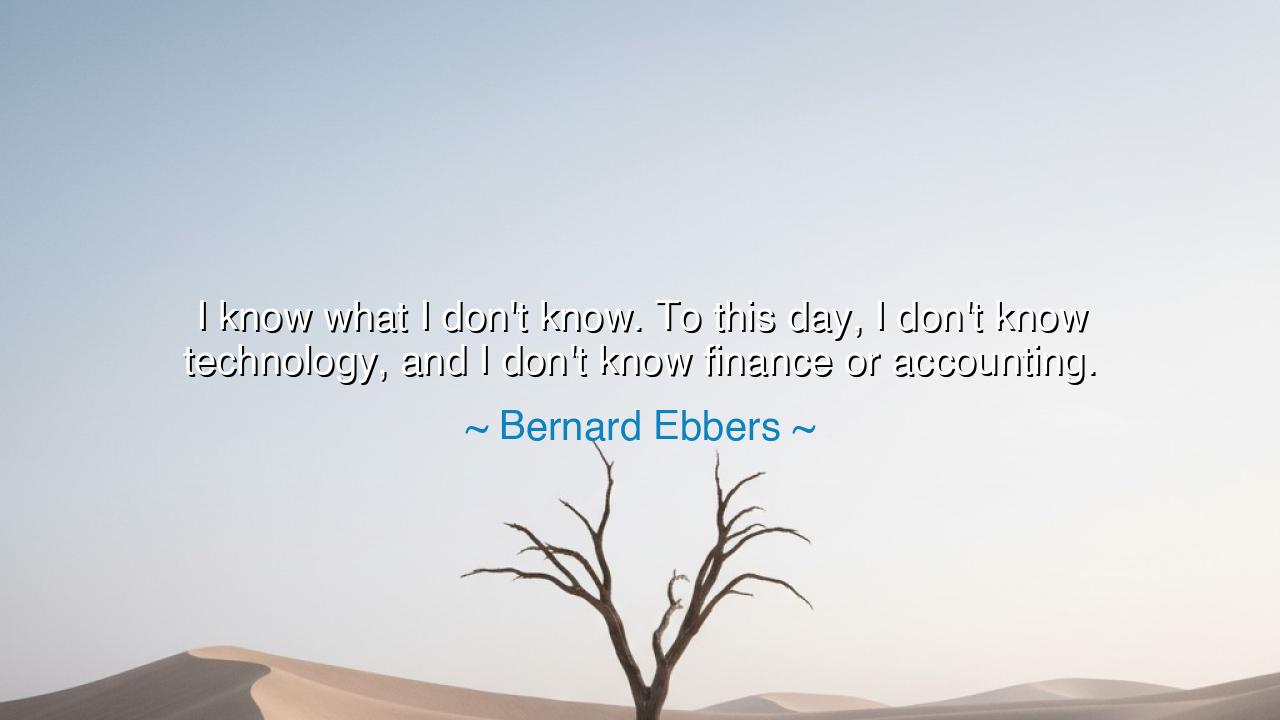
I know what I don't know. To this day, I don't know technology
I know what I don't know. To this day, I don't know technology, and I don't know finance or accounting.






Hear now the words of the fallen merchant, Bernard Ebbers, who once reigned over vast dominions of commerce. From his lips poured a confession most unusual: “I know what I don’t know. To this day, I don’t know technology, and I don’t know finance or accounting.” Strange it is, that a man who commanded one of the world’s largest corporations, WorldCom, should admit ignorance of the very pillars upon which his empire stood. Yet herein lies a paradox of power: that one may hold the crown but not know the stones upon which the palace is built.
This utterance is no shallow jest, but a mirror of human frailty. The ancients taught that wisdom begins with the phrase “I know not.” Socrates, son of Athens, walked the streets proclaiming that his only knowledge was this—that he did not know. And in this humility, he became the wisest of men. But Ebbers’ words echo differently. For he did not wield his ignorance as a lantern of honesty but allowed it to grow into shadow, until it consumed the walls of his house. He spoke truth, yet the truth was dagger and downfall.
Consider the tale of King Croesus, ruler of Lydia, who inquired of the Oracle whether he should march against Persia. The Oracle replied: “If you cross the river, you will destroy a great empire.” Blind with pride, Croesus crossed, believing he would destroy Persia. But it was his own empire that fell. Thus too did Ebbers, who mistook the strength of his ambition for the foundation of knowledge. He entrusted himself to others, yet without vigilance, without the temperance of understanding, the walls crumbled, and ruin followed.
The meaning of Ebbers’ confession is twofold. On the one hand, there is humility in knowing what one does not know. This is the seed of wisdom, for only when a man admits the limits of his sight can he seek a guide. Yet on the other hand, there is danger in power without knowledge, for it makes one a captain who cannot read the stars nor the currents, but who sails proudly into storm. The wisdom of ignorance becomes folly when paired with unchecked authority.
What lesson, then, do we draw? That each soul must learn to discern the boundaries of its own understanding, but also to act with diligence in bridging those boundaries. To say “I do not know” is noble; to stop there is peril. Like the blacksmith who admits he cannot carve wood, yet seeks the carpenter’s counsel, we must not pretend mastery where we have none. But unlike Ebbers, we must never place our lives—or the lives of others—entirely in the hands of mysteries we refuse to learn.
Therefore, beloved listener, let your heart burn with this truth: Ignorance confessed must be ignorance addressed. Do not turn away from the fields of knowledge that frighten you. Learn enough to stand, even if not to rule. Trust others, yes, but do not surrender wholly. For even the general who commands a thousand knows the shape of the sword, even if he does not sharpen it himself.
So take action. Each day, write down what you do not know. Let it be your map, not your shame. Choose one piece of ignorance and chip away at it until it no longer binds you. Seek teachers, seek mentors, seek the scrolls of wisdom. But never again say, “I know not” without adding, “Yet I shall learn.” In this balance lies the true kingdom: humility joined with diligence, confession joined with striving, wisdom joined with courage.
And thus the tale of Ebbers becomes a warning inscribed upon the stones of time. To the proud it says: do not build towers upon sand. To the humble it says: do not stop at knowing what you lack—press onward, until ignorance is no longer your master, but your guide toward wisdom.






AAdministratorAdministrator
Welcome, honored guests. Please leave a comment, we will respond soon